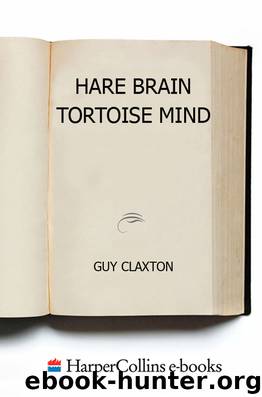Hare Brain, Tortoise Mind by Guy Claxton

Author:Guy Claxton
Language: eng
Format: epub
Publisher: HarperCollins
Published: 2016-04-29T04:00:00+00:00
John Kihlstrom’s interesting remarks about the self and its relation to unconscious processes . . . are quite well supported by some of the data from patients with blindsight . . . I worked many years ago with monkeys who had had the striate cortex [the primary visual part of the brain] removed: they retained extraordinarily sophisticated visual capacity, much better than anything which has yet been discovered in human beings with lesions of the striate cortex. One way of thinking about this is that the monkey has an advantage in that it doesn’t have a particularly highly developed concept of self. Hence the monkey’s non-sensory [i.e. unconscious] visual percepts are nothing like so surprising to the monkey as to the human. For a human to have a percept which isn’t his own percept (related to himself) is very odd indeed. So human patients retreat into saying: ‘I don’t know what’s going on’ and denying their ability to see at all. For the monkey, I suspect [unconscious] perceptual information doesn’t create the same sort of existential paradox, therefore the monkey is much more ready to use it . . . Interestingly, for one particular monkey I worked with for a long time, there were conditions under which she became unable to see again – if she was frightened or she was in pain. It was as though anything which drew attention to her self undermined her ability to use unconscious percepts.15 (Emphasis added)
The more self-conscious we are – the more fragile our identity – the more we shut down the undermind. As people feel increasingly vulnerable, so their access to, and reliance on, information that is faint or fleeting declines. They become not just physically but also mentally clumsy, losing access to the subtler ways of knowing. Conversely, the less self-conscious we are, the more ‘at home in our skins and our minds’, the more it seems we are able to open ourselves to the undermind, and to the mental modes through which it speaks. Self-consciousness is a graded phenomenon; there are milder, more chronic and more widespread degrees of self-consciousness, in which the kinds of deleterious effects we have been discussing still occur, albeit in less intense forms. Extrapolating from the experimental studies, we might hazard the suggestion that many people (at least in busy, d-mode cultures), much of the time, are in a state of low-grade, somewhat pressurised self-consciousness, and that in this state, consciousness is edited and manipulated so that its contents are as congenial and unthreatening to the operative model of self and mind as possible. We attenuate our contact with the iridescent world of the undermind, and may thus deprive ourselves of valuable data. Though we are in fact sensitive to the shimmering reality that underlies consciousness, we act as if we were not – because we do not ‘believe’ in it, do not trust it, or do not like what it has to say.
Blindsight research suggests that one area in which we might expect
Download
This site does not store any files on its server. We only index and link to content provided by other sites. Please contact the content providers to delete copyright contents if any and email us, we'll remove relevant links or contents immediately.
| Administration & Medicine Economics | Allied Health Professions |
| Basic Sciences | Dentistry |
| History | Medical Informatics |
| Medicine | Nursing |
| Pharmacology | Psychology |
| Research | Veterinary Medicine |
The Art of Thinking Clearly by Rolf Dobelli(10443)
The 5 Love Languages: The Secret to Love That Lasts by Gary Chapman(9782)
Mindhunter: Inside the FBI's Elite Serial Crime Unit by John E. Douglas & Mark Olshaker(9313)
Becoming Supernatural by Dr. Joe Dispenza(8196)
Nudge - Improving Decisions about Health, Wealth, and Happiness by Thaler Sunstein(7689)
The Road Less Traveled by M. Scott Peck(7592)
Mastermind: How to Think Like Sherlock Holmes by Maria Konnikova(7313)
Enlightenment Now: The Case for Reason, Science, Humanism, and Progress by Steven Pinker(7305)
Win Bigly by Scott Adams(7183)
The Way of Zen by Alan W. Watts(6594)
Factfulness: Ten Reasons We're Wrong About the World – and Why Things Are Better Than You Think by Hans Rosling(4729)
The State of Affairs by Esther Perel(4710)
Gerald's Game by Stephen King(4639)
Man's Search for Meaning by Viktor Frankl(4573)
The Confidence Code by Katty Kay(4248)
Thinking in Bets by Annie Duke(4216)
The Healing Self by Deepak Chopra(3568)
Hidden Persuasion: 33 psychological influence techniques in advertising by Marc Andrews & Matthijs van Leeuwen & Rick van Baaren(3549)
The Worm at the Core by Sheldon Solomon(3483)
